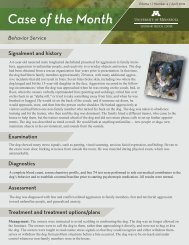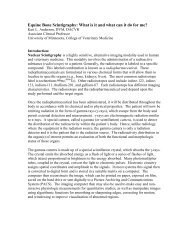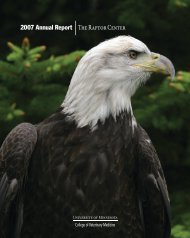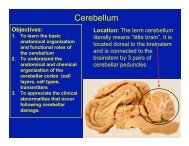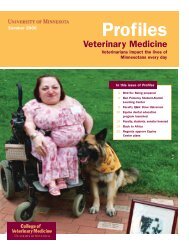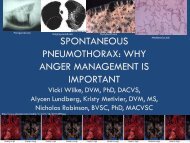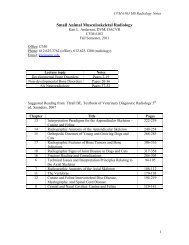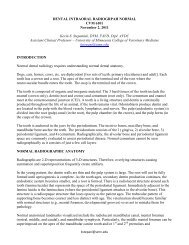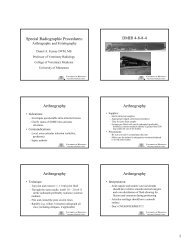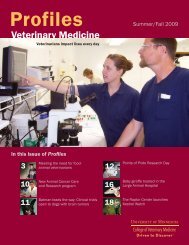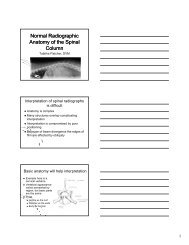Summer/Fall 2013 PDF - University of Minnesota College of ...
Summer/Fall 2013 PDF - University of Minnesota College of ...
Summer/Fall 2013 PDF - University of Minnesota College of ...
Create successful ePaper yourself
Turn your PDF publications into a flip-book with our unique Google optimized e-Paper software.
STUDENT COUNCIL<br />
Student<br />
council:<br />
providing a bridge for<br />
students and faculty<br />
Andy Kryzer, class <strong>of</strong> 2015, didn’t waste any<br />
time getting involved in student government.<br />
As a second-year veterinary student, he<br />
became president <strong>of</strong> the student council.<br />
Now one <strong>of</strong> 16 elected council members, he<br />
excels at relating to his fellow students, as<br />
well as to pr<strong>of</strong>essors, department heads, and<br />
college administrators.<br />
Council members act as representatives<br />
<strong>of</strong> the college’s DVM student body to<br />
the Graduate and Pr<strong>of</strong>essional Student<br />
Assembly, the Academic Health Center, the<br />
St. Paul Board <strong>of</strong> <strong>College</strong>s, the <strong>University</strong><br />
<strong>of</strong> <strong>Minnesota</strong>, and the public at large.<br />
The council has four main purposes:<br />
serving as a liaison between the<br />
administration <strong>of</strong> the <strong>College</strong> <strong>of</strong> Veterinary<br />
Medicine and veterinary students;<br />
providing a forum for both academic<br />
and extracurricular student concerns;<br />
organizing philanthropic events for<br />
worthwhile veterinary medical student<br />
associations; and providing social<br />
activities and events for fellow students.<br />
“We hold regular meetings with<br />
department chairs to cover any big<br />
issues, and we look for ways to create<br />
new programs and social events so<br />
that students can enjoy a well-rounded<br />
education,” says Kryzer. The student<br />
council also meets every other week to<br />
discuss strategy, events, and issues.<br />
“The student council is perceived as—<br />
and functions as—an unbiased group<br />
<strong>of</strong> student representatives to help us<br />
understand any issues or problems that<br />
arise,” says Dr. Laura Molgaard, associate<br />
dean for academic and student affairs.<br />
“The council acts both proactively and<br />
reactively as issues come up.”<br />
One recent accomplishment <strong>of</strong> the council<br />
was to lend advice in the establishment<br />
<strong>of</strong> a noon-hour plenary session called<br />
Case Presentations From Basic Science<br />
to Clinical Medicine. During this session,<br />
several faculty members from various<br />
disciplines presented a case study,<br />
providing information and questions<br />
tailored to each class level in attendance.<br />
The student council gave input in the<br />
planning stages as well as valuable<br />
feedback on student perceptions <strong>of</strong><br />
what worked and what could be done to<br />
enhance future sessions.<br />
The council also provides a forum for<br />
students to interact with each other and<br />
with faculty in a social setting. This past<br />
February, for example, the council rented<br />
20-plus lanes at Flaherty’s Arden Bowl<br />
in Arden Hills, <strong>Minnesota</strong>. The four-hour<br />
event drew a crowd.<br />
“We made sure it was low-cost to attract<br />
a large number <strong>of</strong> students,” says Kryzer.<br />
“And we made sure that on each lane<br />
there were both students and faculty, so<br />
the faculty could share their personal<br />
experiences, challenges, and successes <strong>of</strong><br />
attending veterinary school.”<br />
By interacting with faculty members,<br />
Kryzer says, students can learn more about<br />
which academic track they want to pursue:<br />
food animal, small animal, mixed animal<br />
(including wildlife, zoo, and exotic),<br />
equine, or research/public health.<br />
“Determining which academic route to<br />
take can be a real challenge,” says Kryzer.<br />
“Having an opportunity to talk to and get<br />
to know faculty who can <strong>of</strong>fer suggestions<br />
and talk about their research can stimulate a<br />
student to pursue a specific academic track.”<br />
In April, the council hosted a barbeque<br />
for approximately 300 people as part <strong>of</strong><br />
Student Appreciation Week.<br />
“The barbeque was the student council’s<br />
idea,” says Molgaard. “They really wanted<br />
to host a fun event to allow students and<br />
faculty to have another opportunity to<br />
interact in an informal setting.”<br />
While the council advocates for student<br />
needs, Molgaard says the students on<br />
the council are true liaisons. “They do a<br />
great job by acting in a cooperative and<br />
supportive role,” she says. “They work to<br />
understand the issues and to find solutions.<br />
Then they work with us for the best<br />
interest <strong>of</strong> both the faculty and students.”<br />
STUDENT PROFILE<br />
Andy Kryzer<br />
CLASS: 2015<br />
HOMETOWN: Lewiston, <strong>Minnesota</strong><br />
STUDENT ORGANIZATIONS:<br />
president, CVM Student Council;<br />
bovine chair, Production Animal<br />
Medicine Club; junior delegate,<br />
American Association <strong>of</strong> Bovine<br />
Practitioners; class representative,<br />
CVM class <strong>of</strong> 2015; coordinator,<br />
CVM blood drive; member, CVM<br />
Swine Group and Student Chapter<br />
<strong>of</strong> the American Veterinary Medical<br />
Association<br />
PROFESSIONAL GOALS: Kryzer<br />
hopes to practice food animal<br />
medicine in rural <strong>Minnesota</strong><br />
with an emphasis in bovine and<br />
swine. He will strive to not only<br />
excel in disease prevention,<br />
diagnosis, and treatment <strong>of</strong> food<br />
animals to ensure a safe food<br />
supply, but also to work with<br />
producers to improve their bottom<br />
lines. He also plans to act as a<br />
liaison between animal caretakers<br />
and governmental policymakers for<br />
the betterment <strong>of</strong> animal care. In<br />
addition, he plans to maintain his<br />
farming roots by expanding his<br />
family’s beef herd and building his<br />
own swine fi nishing barns.<br />
Pr<strong>of</strong>iles <strong>Summer</strong>/<strong>Fall</strong> <strong>2013</strong> 27



